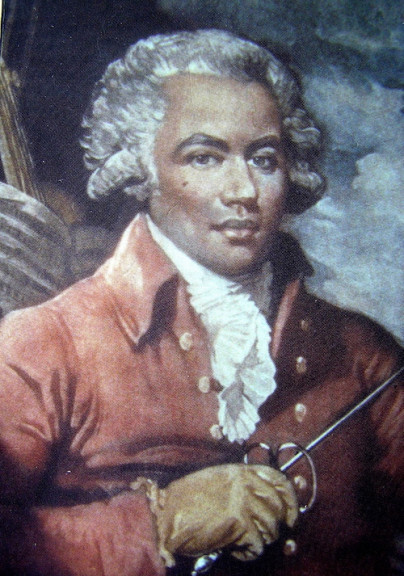Classically Black: Joseph Bologne, Chevalier de Saint-Georges

Composer Joseph Bologne, Chevalier de Saint-Georges posing with his fencing foil Portrait by Mather Brown, 1787
There’s been a lot of buzz lately about eighteenth-century composer Joseph Bologne, aka Chevalier de Saint-Georges. In the last few years, as music organizations have sought to broaden their repertoire to historically excluded composers, Bologne’s music has seen a resurgence. And it’s no wonder. His music rivals, and even surpasses, that of his better-known contemporaries, and his biography is truly remarkable. So remarkable, in fact, that a feature film was recently made on his life. (The film, Chevalier, was released in the United States just last month.)
In brief, Joseph Bologne (1745–1799) was born in the French colony of Guadeloupe to an enslaved Senegalese woman named Nanon (who was only 16 at the time) and her enslaver, a white planter named George Bologne. In 1753, George sent his son to a Jesuit boarding school in southwest France. Two years later, Nanon and George reunited with their son and moved to Paris, where Joseph was enrolled in a private fencing academy. Little is known about his early musical education, but he was a highly accomplished violinist by the time he reached adulthood. Bologne defied all odds, overcoming racial prejudice to become a renowned musician and composer who rubbed elbows with French royalty and was even said to have influenced W. A. Mozart. He also became a national fencing champion and later a colonel in the army of the French Revolution. He is considered the first European musician/composer of African descent to receive widespread critical acclaim.
Roger Cooper, longtime host on WILL-FM, was way ahead of the Chevalier mania. In 2003, he produced an episode of his show Classically Black devoted to the woefully neglected early classical composer. In light of Bologne’s recent entrance into the popular consciousness, we thought we’d revisit Roger’s show, which recounts the fascinating life story of Joseph Bologne to the soundtrack of some of his works.
Episode Playlist
(Works by Joseph Bologne unless otherwise noted)
- Violin Concerto No. 9 in G Major, Op. 8: III. Rondeau – Takako Nishizaki, Helmut Müller-Brühl & Cologne Chamber Orchestra
- Symphony No. 1 in G major, Op. 11: Allegro – Orchestra de Chambre de Versailles, Bernard Wahl & Anne-Claude Villars
- String Quartet No. 1 in C Major, Op. 1, No. 1: I. Allegro – Paul Freeman & Julliard String Quartet
- Symphonie Concertante in G Major for Two Violins and Orchestra – Paul Freeman, London Symphony Orchestra
- Scena from Ernestine – Paul Freeman, London Symphony Orchestra, Faye Robinson, soprano
- Symphony No. 2 in D major, Op. 11: Presto, Orchestra de Chambre de Versailles, Bernard Wahl & Anne-Claude Villars
- J. S. Bach: Ich ruf zu dir Herr Jesu Christ, Chorale Prelude BWV 639 (Transcribed by Ferruccio Busoni) – Víkingur Ólafsson, piano
- Aria with Variations in G Major – Brigitte Haudebourg & Jean Jacques Kantorow



